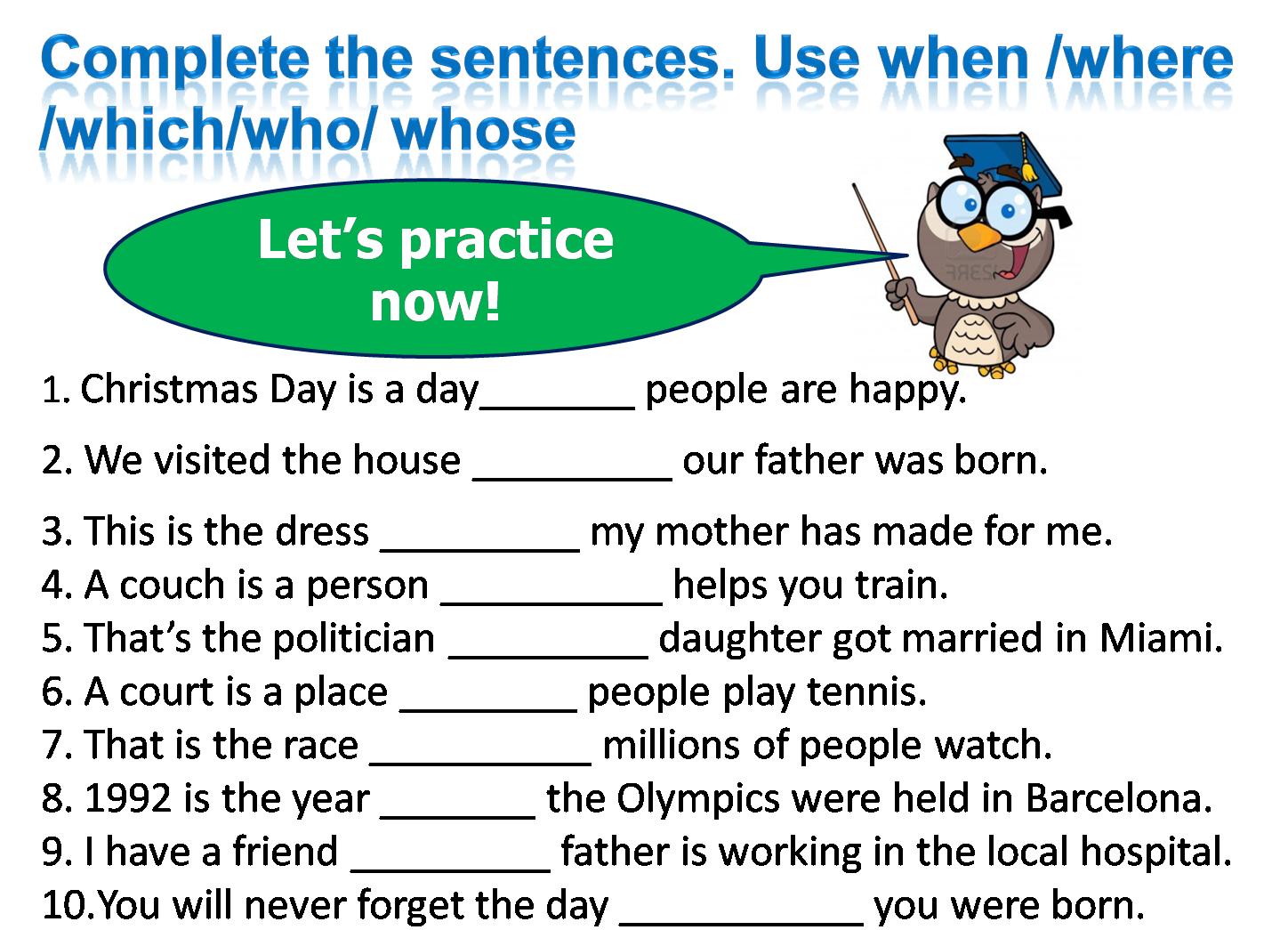Unggulan
- Dapatkan link
- X
- Aplikasi Lainnya
Relative Clauses : English module5: RELATIVE CLAUSES - It is also called adjective clause because it defines a noun.
Relative Clauses : English module5: RELATIVE CLAUSES - It is also called adjective clause because it defines a noun.. They function rather like adjectives, and are found as postmodifiers in a noun phrase. They commonly qualify or give more information about a noun. Lord thompson, who is 76, has just retired. In english, there are two types of relative clauses: They may add meaning, but if they are removed, the sentence will still function grammatically.
It is sometimes called an adjective clause because it functions like an adjective—it gives. Relative clauses tell us more about people and things: Relative clauses allow us to provide additional information without having to start a new sentence. A relative clause is a clause that begins with a relative pronoun. Defining relative clauses don´t use commas and provide necessary information to.
When to use which and.
The basic relative pronouns are who, which, and that; The relative pronoun is the subject the relative clause can come after the subject or the object of the sentence. Various grammatical rules and style guides determine which relative pronouns may be suitable in. This is the house which jack built. A relative clause is one kind of dependent clause. It has a subject and verb, but can't stand alone as a sentence. A relative clause is a sentence describing a noun, however, it cannot be used separately. They function rather like adjectives, and are found as postmodifiers in a noun phrase. Relative pronouns and relative clauses connect two ideas into one sentence. Since relative pronouns are an essential part of relative clauses, let us first discuss what relative pronouns are. It is sometimes called an adjective clause because it functions like an adjective—it gives. Lord thompson, who is 76, has just retired. Defining relative clauses (also called identifying relative clauses or restrictive relative clauses) give detailed information defining a general term or expression.
Relative clauses tell us more about people and things: Defining relative clauses (also called identifying relative clauses or restrictive relative clauses) give detailed information defining a general term or expression. Defining relative clauses don´t use commas and provide necessary information to. It is also called adjective clause because it defines a noun. It is sometimes called an adjective clause because it functions like an adjective—it gives.

A relative clause is one kind of dependent clause.
A relative clause is a subordinate clause that contains the element whose interpretation is provided by an expression on which the subordinate clause is grammatically dependent. Relative clauses allow us to provide additional information without having to start a new sentence. Relative pronouns and relative clauses connect two ideas into one sentence. Relative clauses can cause trouble in english, specially when they begin with less common forms of the pronoun who, such as whom? It comes after the noun defined by a basic sentence. They may add meaning, but if they are removed, the sentence will still function grammatically. Who also has the derived forms whom and whose. The relative pronoun is the subject the relative clause can come after the subject or the object of the sentence. They commonly qualify or give more information about a noun. A relative clause is a clause that usually modifies a noun or noun phrase and is introduced by a relative positioning relative clauses unlike prepositional phrases, restrictive relative clauses. They function rather like adjectives, and are found as postmodifiers in a noun phrase. Since relative pronouns are an essential part of relative clauses, let us first discuss what relative pronouns are. A relative clause is one kind of dependent clause.
It is sometimes called an adjective clause because it functions like an adjective—it gives. A relative clause is a clause that usually modifies a noun or noun phrase and is introduced by a relative positioning relative clauses unlike prepositional phrases, restrictive relative clauses. A relative clause is a sentence describing a noun, however, it cannot be used separately. Relative clauses tell us more about nouns. Various grammatical rules and style guides determine which relative pronouns may be suitable in.

Defining relative clauses are not put in.
Relative clauses follow whatever it is that they are qualifying. Relative clauses are clauses starting with the relative pronouns who*, that, which, whose, where, when. It is sometimes called an adjective clause because it functions like an adjective—it gives. Relative clauses tell us more about people and things: A relative clause is one kind of dependent clause. It has a subject and verb, but can't stand alone as a sentence. This is why they are also known as adjective clauses. A relative clause is a clause that begins with a relative pronoun. In english, there are two types of relative clauses: A relative clause is a sentence describing a noun, however, it cannot be used separately. Relative clauses in the english language are formed principally by means of relative pronouns. A relative clause is a subordinate clause that contains the element whose interpretation is provided by an expression on which the subordinate clause is grammatically dependent. A relative clause is a clause that usually modifies a noun or noun phrase and is introduced by a relative positioning relative clauses unlike prepositional phrases, restrictive relative clauses.
- Dapatkan link
- X
- Aplikasi Lainnya
Postingan Populer
Figurinhas Do Ceará Whatsapp / Como usar as figurinhas do Messenger no WhatsApp com o Android - Existem dezenas de aplicativos para fazer figurinhas de whatsapp.
- Dapatkan link
- X
- Aplikasi Lainnya
Renungan Harian, Senin, 21 Juni 2021 / Renungan Katolik Kamis 22 April 2021 - Iq9qvyjscguxnm ... / Renungan harian rabu, 30 juni 2021.
- Dapatkan link
- X
- Aplikasi Lainnya
Komentar
Posting Komentar